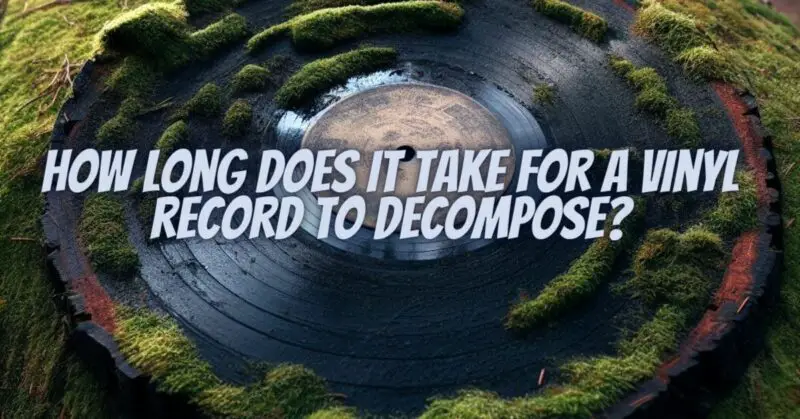Vinyl records, with their timeless appeal and analog charm, have been a beloved medium for music enthusiasts for decades. However, like all physical materials, vinyl records are not immune to the forces of time and environmental factors. This article delves into the question of how long it takes for a vinyl record to decompose, exploring the composition of vinyl records, the factors influencing their degradation, and the environmental impact of vinyl disposal.
The Composition of Vinyl Records
To understand the decomposition process of vinyl records, it’s essential to comprehend their composition:
- Vinyl Disc: The main body of a vinyl record consists of polyvinyl chloride (PVC), a type of plastic known for its durability and resilience.
- Grooves: The music is encoded as grooves on the vinyl’s surface. A turntable’s stylus tracks these grooves to produce sound.
- Label: The central label contains vital information about the recording, artist, and album.
Factors Influencing Decomposition
The rate at which vinyl records decompose is influenced by various factors:
- Environmental Conditions: Exposure to environmental elements such as sunlight, humidity, and extreme temperatures can accelerate the degradation process.
- Mechanical Stress: Frequent playback with a worn or damaged stylus can cause wear and tear on the grooves, impacting audio quality and potentially accelerating degradation.
- Chemical Reactions: Over time, vinyl records may undergo chemical reactions, leading to changes in their physical properties. Exposure to chemicals or pollutants can exacerbate these reactions.
- Microbial Activity: In rare cases, vinyl records stored in humid environments may be susceptible to microbial growth, which can cause damage.
- Physical Damage: Physical damage, such as scratches, cracks, or warping, can hasten a vinyl record’s deterioration.
How Long Does It Take for a Vinyl Record to Decompose?
The decomposition of vinyl records is a gradual process that occurs over an extended period, measured in centuries rather than decades. Under typical storage conditions, vinyl records can remain intact and playable for several hundred years. However, several factors influence the rate of decomposition:
- Proper Storage: Proper storage conditions, including controlled temperature and humidity, can significantly extend a record’s lifespan.
- Minimal Playback: Limiting playback and ensuring that a well-maintained stylus is used reduces wear and tear on the grooves.
- Protection: Using anti-static inner sleeves and high-quality outer jackets helps protect records from physical damage and environmental elements.
- Careful Handling: Gentle handling and avoiding physical stress during storage and playback also contribute to preservation.
The Environmental Impact of Vinyl Disposal
As vinyl records are primarily composed of PVC, their disposal can have environmental implications. PVC is a type of plastic that is not biodegradable and does not decompose readily in natural environments. When vinyl records end up in landfills, they can persist for an extended period, contributing to plastic waste.
Therefore, it is essential for music enthusiasts and collectors to consider responsible disposal options for vinyl records they no longer wish to keep. Options include recycling, upcycling, or donating unwanted records to others who may appreciate them.
Vinyl records, with proper care and maintenance, can endure for centuries before showing significant signs of decomposition. To preserve the legacy of vinyl records, collectors and enthusiasts should prioritize responsible storage and handling practices. When the time comes to part with vinyl records, considering eco-friendly disposal options is crucial to minimize their impact on the environment and continue to share the joy of music with future generations.


